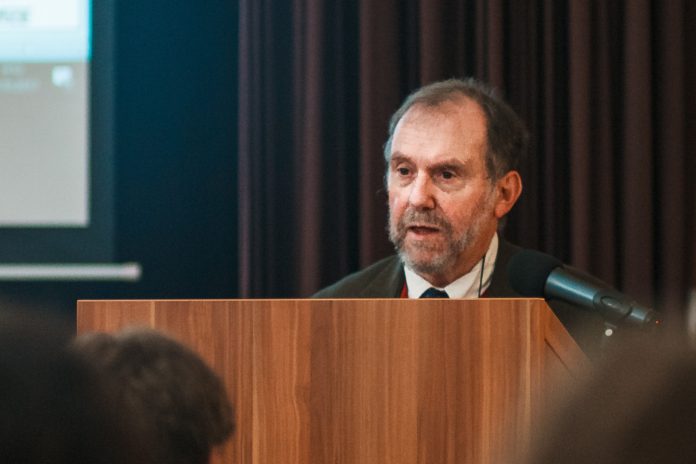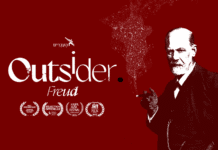David Bell is a Past President of the British Psychoanalytical Society and one of the leading experts on the relation between psychoanalysis and other disciplines: literature, philosophy, culture, socio-political issues and human rights. This interview took place in Prague during the „2nd Fenichel’s conference: Psychic change“ in October 2017. In the next months we also will subsequently publish opinions of other conference speakers on these topics.
Jakub Kuchař: Can psychoanalysis and psychoanalysts influence contemporary socio-political situation? If so, in which concrete ways?
Well, yes, in a certain sense, but not quite in the line of the question. Because the way in which people influence socio-political-cultural-historical situation is through engagement, like other intellectuals, with understanding. So the analyst’s role is to contribute to the intellectual culture in order to understand things and in hope that people can make use of the understanding. The understanding can form a part, for example, of ongoing critique of the society. I think that psychoanalysis, in my view, must alway have a critical relationship with the culture in which it defines itself. It should never completely belong to the culture. It should be both inside and outside. In my own work I have made a use of psychoanalytic understanding to contribute to the discussions on the nature of human violence and to contribute to the discussions on the violent destruction of the welfare state – what kind of subjectivity this violence engages with. For example, the hatred of vulnerability and dependence which we tend to project to other people who we then treat with contempt. Same can be said of trying to understand the nature of racism, for example. In which the hated object has projected into it all the disowned parts of the self like the Jew or the Black are seen as violent, greedy and hypersexual. There has been some excellent discussions, some by analysts some by non-analysts, on understanding these cultural events. In the current time when we see such a swinging to the right and the rebirth of fascist states of mind, particular in relation to migrants and immigration, the analyst cannot change that. But the analyst can contribute to the understanding of the processes. There is a wonderful german intellectual called Enzensberger who writes about these projective processes. But he doesn’t write as an analyst he writes as a literary cultural theorist with a deep understanding of them. Hanna Segal and the previous generation made very important contributions to the understanding of the denial of the threat of a nuclear war. In 70s and 80s, she felt the analytic contribution was to how could we understand that people were about in such a states of denial of the real possibility of a global nuclear war and the kinds of mentalities that celebrated this possibility, for example, the fundamentalist christians who believed in armageddon but also the ways ordinary people could not bear to face the devastating consequences of the nuclear war and were too easily reassured by their political leaders.
So If I understand you right, you think that some psychoanalysts should be active in the broader intellectual circles and show their psychoanalytic ideas to the public?
Yes, but I don’t think you can say that all of them should because it depends on the individual. Some analysts prefer to do just their clinical work. But I think that Freud did not think that the most important thing was a treatment. Freud thought that psychoanalysis made a contribution to the understanding to the culture and human psychology and that was it’s more important contribution. So of course an analyst should do what they can to make this kind of understanding available to ordinary which we can do for understanding of groups and socio-cultural-political processes.
And how do these psychoanalysts who are active in these broader intellectual circles can reconcile this activity with the classical notion of neutrality and anonymity?
I think it is a misunderstanding of neutrality. Neutrality is something for the consulting room. But if there is to engage in political events, I think it would be difficult for an analyst to be the member of Parliament or to be a politician. But to engage as a citizen I don’t think it is a problem in terms of neutrality. Hanna Segal puts it very well. The way she put it was that analysts when they step up of the consulting room are citizens like anyone else. And to believe they can’t comment on the world around them is not neutrality. That is self-castration. So neutrality is for the consulting room. If the patient hears you have spoken to a newspaper or given a talk then it becomes more material to understand what it means to them. I think the other thing to say is that in the world we are in, there is no such a thing as neutrality. Neutrality outside of a consulting room is merely an acceptance of the political world and that is a form of participation. There is no non-alignment position. If you are living in the world where there is a hatred of immigration and the possibility of the growth of nazi elements, there is no neutrality. If you say nothing it is kind of participation. Hanna Segal wrote a paper which was called “Silence is the real crime”.
And what do you think about the relationship between the psychic change and the changes in society? Could we you this logic from understanding the individual to analyse society?
No, the way I understand it is that psychoanalysis makes a contribution to understanding. So through understanding the of nature of subjectivity or the nature of denial or unconscious we can make a contribution to understanding any situation with which human beings are involved. But we do not have the answer. It is not a reductionist psychology. So we don’t reduce socio-political-economic events purely to individual psychology. That would be a great error. But we could say that through our understanding of human psychology we can make a contribution along side economists, historians, anthropologists, sociologists and so on. And our contribution is unique in that we have this deep understanding of unconscious psychic life so we can bring that to the table but we don’t reduce it to that. For example, in the movement that started in Germany and then went to America of the Frankfurt school, the great philosophers like Adorno and various others they had seen the catastrophe of the second world war and they wanted to understand what is the soil inside of human being that makes these scene germinate. People can change quickly. From one moment, they can be friendly next-door neighbour and the next day slaughter each other. So we have to understand the nature of these processes inside us and we can ask what kind of socio-cultural-political process support the better parts of our nature and what support the destructive and violent parts of our nature. So from my perspective there should be a situation where there is social housing, social education and provisions that no one should be on the streets with no money and nothing. This creates a social condition in which we respect each other. Those social conditions in which the possibilities of welfare are destroyed and everything is turned into a capitalist market creates a social situation for the germination of greed, narcissism, selfishness and hatred of vulnerability.
So as an psychoanalyst who publishes his ideas publicly you can influence, for instance, some politicians or some people who design these things in order to help them find a better solution to solve these social problems?
Yes, it if they are available to be influenced. Many politicians have too much their eye on getting votes and less of an eye on this. Freud wrote famously in the ego and the id about how the ego tries to please everyone, it tries to please the instincts, it tries to please external reality, it tries to please the superego. And sometimes you can say that the ego is like a politician who is trying to make favor with everyone. But not all politicians are like that. Some politicians there are genuinely interested in trying to understand. And those who are can make use of the ideas that psychoanalysis might bring. I have spoken recently at the meeting about mental health and there was a member of parliament there and she was interested in what I brought in terms of the consequences for mentally ill people on the short term psychiatric treatment which provide no provision for the long-term care and turn everything into a packaged illnesses to be treated rather than a suffering human being. So she was interested. Other people may be interested in our understanding the rise of the right and racism and so on. But we should not expect it necessarily. Politicians have to listen to lot of people. It had to be particularly minded politicians. In England the long time ago the British Psychoanalytic Society made a more concrete contribution in terms of the decriminalization of homosexuality and also in terms of the end of the death penalty. We were asked our view and we were able to give our psychoanalytic understanding. I think that psychoanalysis as a subject has a less place in the cultural life than it did in 60s and therefore it is not so likely that a working party of the government would contact the British Psychoanalytic Society. But if they did we would be happy to offer a view.
David Bell is a training Analyst of the British Psychoanalytic Society and also a Past President. He is a consultant psychiatrist at the Tavistock where he directs a specialist unit (the Fitzjohns Unit) for serious/enduring complex disorders. In 2012-13 he was Visiting Professorial Fellow at Birkbeck College London. His writing and lecturing interests include the development of psychoanalytic concepts, psychosis and borderline states. Throughout his professional career he has been deeply involved in the relation between psychoanalysis and other disciplines: literature, philosophy, culture and socio-political issues and has published extensively in these areas. Publications include Paranoia, Psychoanalysis and Culture, Reason and Passion, Living on the Border. He is one of the UKs leading psychiatric experts in asylum and human rights.




